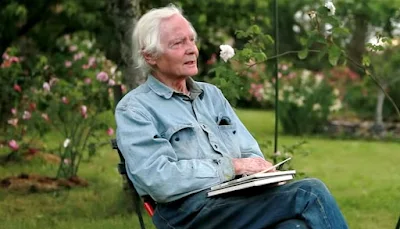Among the many things that were generally predictable the morning after the 2016 election was what happened this past week: the furor over impeachment dominated the news, easily overshadowing everything coming out of the UN climate session, including the new UN report which warns of a very dim future for the oceans, hence human civilization. (In passing let me say that I've tried to face up to effects of the climate emergency, even keeping informed on the deeply sorrowing fate of the forests. But I've turned away from directly confronting detailed estimations of the oceans' fates--it's just too ultimate a subject. But I can't any longer.)
Still, it hasn't taken impeachment to distract from climate crisis news. Almost anything will do--any shiny object to distract us from the predator hiding in the hills. But a couple of things did break through last week: the worldwide climate strikes by young people last Friday and today (with total participation estimated at 6 million people), and a girl named Greta.
Greta Thunberg, who is usually described as the teenager from Sweden, has led these enormously successful strikes, and has become a global public figure, with the predictable consequences of being lionized by some and demonized by others. Her 495 word address to the United Nations is already being compared to Lincoln's Gettysburg Address.
Is this the inflection point it appears to be--a generational change? For several years, veteran writer and climate activist Bill McKibben has focused his energies on organizing young people in a gradually accelerating global movement. But now it has a young leader speaking clearly and eloquently for her generation.
How this goes remains to be seen, of course. In the US there seemed to be a generational change in opposition to America's gun spree, when high school survivors of a mass shooting spoke out, but that seemingly has faded.
This may be different. Greta's generation--including college-age young people --is more aware and more focused on the climate emergency than any other issue. What made Greta's UN comments especially effective was her emphasis on the future that her generation will inherit.
That has been the concern of this old fart for some years. In the past year or so I've paid particular attention to ideas about what the world will actually be like for those now growing up, because it will be the world in which they live their lives. According to the latest scientific findings, it is unlikely that human civilization will be wiped out in this century (though global pandemic and/or thermonuclear war resulting from climate stresses could change that.) At the same time, it is highly likely that the climate emergency will dominate much of that future. So what do they do?
I happened upon an interview with Sarah Myhre, an American climate scientist in her late 30s, with a 5 year old son. It is enlightening on several subjects (she warns against depending wholly on science; she points out that this current movement is not just of young people but more chiefly of girls) but her words to young people about their future are especially relevant.
She tells of her encounter with a teenage boy who was "really, really profoundly upset" and despairing about the world's future, and the irrevocable ruin of the natural world in particular. She told him this:
"So I tried to counsel him as best I could in the moment, around this window of time being a gift and an opportunity, and that he was born onto a changing planet—he did not betray the world. And that although many things will change in the future, not everything will change as well. Getting really clear about the things that are not on the table to change can help us feel safer in this moment.
In the future, regardless of the scale and the nature of the chaos and the climate breakdown, there are certain things that we will not lose. The world will always be beautiful. We will always make art, we will always sing songs, we’ll always be family, and we’ll always love one another.
There are really important pieces about what it means to be a human being that are not on the table to change in the future. That can help folks feel secure and sort of nourished, in order to be able to look more squarely at what is on the table in the future."
Though she is certainly right that not everything will change (or fall apart) overnight, Myhre is perhaps a little too definite about the values that will survive. Though they will probably survive, it may well take effort and attention to make sure they survive. That is part of the work of the future that these young people will need to do. If they do, they will have lives worth living. If as well they devote their working lives to efforts to address the causes and effects of the climate emergency, their lives will have more meaning than many lives do today.
Every generation faces a world they did not make, and challenges caused and left unmet by previous generations. Some generations face more serious challenges than others, and surely the future is likely to be greatly challenging. But it does present opportunities for more meaningful lives, not only in what people do for the world but in the example they set, of decency, compassion and courage. President Obama's advice remains appropriate: "be kind, be useful, be fearless."
Is the Story of Sports the Story of Injuries?
-
A lot has happened to the teams I follow in just a few weeks. The
Pittsburgh Steelers were ignominiously defeated by the Houston Oilers in
their wild ca...
2 days ago





















